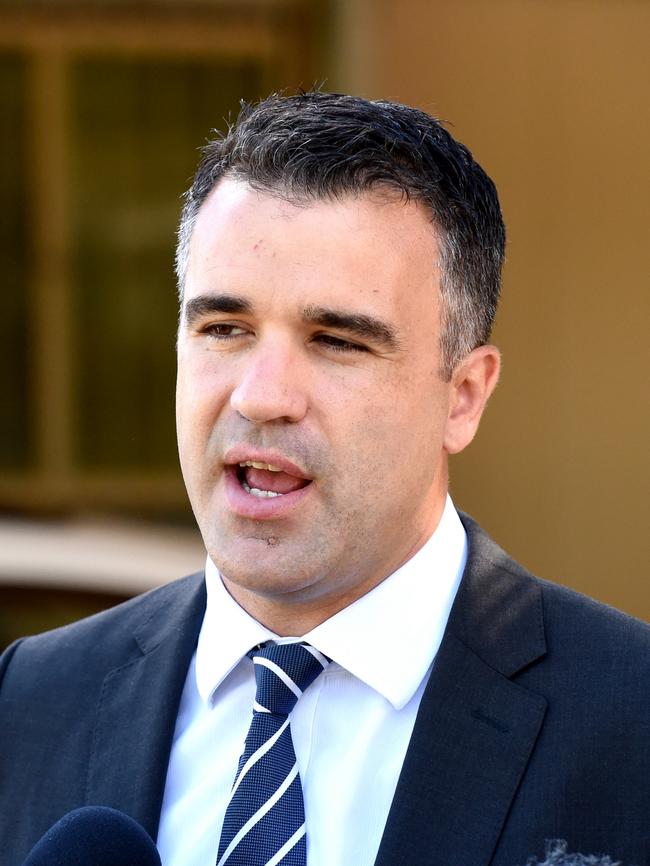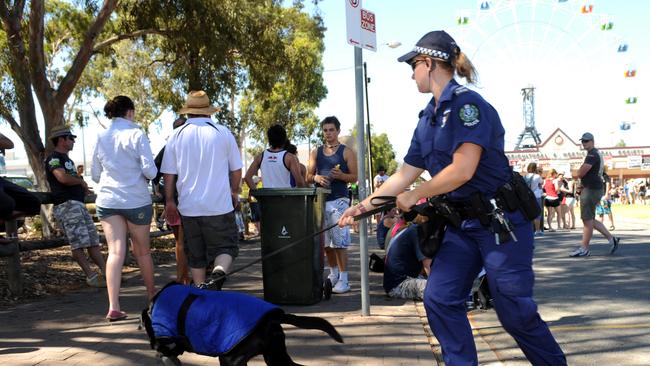Anti-drug campaigners claim ice epidemic will worsen unless governments push rehab over jail
MORE rehab beds — not increasingly harsher prison terms — is the solution to stemming the burgeoning ice epidemic, but the public appears to want to shun the expert advice.
News
Don't miss out on the headlines from News. Followed categories will be added to My News.
- Your five-minute guide to Your Say SA survey
- South Aussies rank power bills, supply above climate change
- Why it’s time for SA to take a happy pill
- Your Say: Growing support for better trading hours
MORE rehabilitation beds – not increasingly harsher prison terms – is the solution to stemming the burgeoning ice epidemic, experts and anti-drug campaigners believe.
Almost 80 per cent of respondents to the survey identified drug abuse and the ice epidemic as the greatest issue facing law-enforcement authorities, with almost 90 per cent believing not enough was being done to stop the misery caused by methamphetamines.
While many respondents believed longer prison terms were warranted for those caught selling ice, Macquarie University drug expert, Professor James Martin, said jailing drug addicts would do nothing to halt the epidemic.
“It costs between $80,000 to $100,000 a year to keep somebody in a medium-security prison, and it costs around a third of that to keep someone in a rehab facility where they are actually getting treatment and will be a lower risk of re-offending,” Dr Martin said.
“When we spend a fortune on solutions that we know to be ineffective, that’s less money to spend on treatments we know to be effective.”

Dr Martin said every dollar spent on rehabilitation services was more cost-effective than bolstering law enforcement efforts. “Incarceration is not typically a good way of reducing further offending, so while it’s understandable to want to increase sentences, it might be exposing the public to more harm in the long run,” he said.
“So that tough-on-crime approach is not a smart move, it’s not a smart-on-crime approach and it’s not supported by the evidence available.’’
Mt Gambier anti-ice campaigner Karen Judd has spent the past two years lobbying for a dedicated rehabilitation centre for methamphetamine addicts, but said both state and federal governments have done next to nothing to implement extra services.
“Unfortunately the horse has bolted. This scourge on our country is way out of control. I’m saddened by the amount of violence and deaths relating to families,” Ms Judd said.
“People dying from drug-related issues is a public health problem, not politics.”
She said Australia should “step out of the conventional box” and adopt a similar policy to Portugal, where addicts were offered rehabilitation services while high-level dealers incurred harsh prison terms.
Mental Health and Substance Abuse Minister Peter Malinauskas said the State Government had committed $8 million towards cutting the supply of ice and increasing treatment, support and education.
“In the regions, which we know are particularly impacted by ice use, we have introduced drug testing kits for regional police and will have 18 new residential rehabilitation beds operational from early 2018,” Mr Malinauskas said.
Opposition Police spokesman Stephan Knoll said a Liberal government would review all penalties for drug offences, cut the number of chances for offenders to take part in drug diversion programs and to allow sniffer dogs to enter schools when requested.
Dr Martin said using tougher penalties for drug offences relied upon a flawed foundation — that those caught selling had made a “rational choice” to do so.
“Many offenders are not considering this in a rational way (and) in those instances you can have any penalty you like ... but having tougher sentences is not something that is going to deter them,” he said.
You want harsher punishment to fit the crimes
South Australians want authorities to get tougher on crime by handing down harsher penalties, treating serious youth offenders like adults and increasing the number of police on the beat, the survey reveals.
The results showed 80 per cent of respondents wanted youths charged with serious crimes to be sentenced as adults, believing such a move would deter others.
It also showed most people wanted more severe penalties for youth and adult offenders – Almost 73 per cent of people thought sentences handed out by SA courts were, in general, too lenient. Meanwhile, almost 58 per cent believed there were not enough police officers on the beat in SA and 71.8 per cent supported proposed police anti-terror shoot-to-kill laws.
Police Minister Chris Picton said the State Government was taking action to crack down on crime.
“We already have the highest number of police per capita of any Australian state and we’re well on track to meet our target of recruiting an additional 313 police officers to put more frontline police out on the beat,” he said.
“We have invested significantly in resources and legislative change to give police increased powers to keep our community safe, including the introduction of disassociation laws and tougher penalties to crack down on bikie gangs, and increasing penalties for illegal drug manufacturers.

“We’re (also) increasing the number of police sniffer dogs and giving officers in regional areas mobile drug-testing kits to identify illicit substances on the spot.”
Opposition police spokesman Stephan Knoll said SA did not just need to be tough on crime, it also needed to “act smarter about crime”. “We have to keep our community safe and the best way to do that is to focus on reducing crimes being committed in the first place,” he said.
“This is a difficult task but for those who have suffered at the hands of criminals.
“It would be so much better to stop those tragedies happening in the first place and stop the pain that they and their family and friends go through.”
The survey also found:
MORE than 81 per cent of respondents believe killers who plead guilty to murder should not be sentenced to less than the mandatory jail term of 20 years.
ALMOST 75 per cent think people should be able to ask police for details of a partner’s criminal history if they may have been violent or abusive in the past.
RESPONDENTS were divided in their opinions on how best to reduce crime, with 51.5 per cent saying jailing more criminals would help while the remaining 48.5 per cent thought sending criminals to rehabilitation would be an effective strategy.


